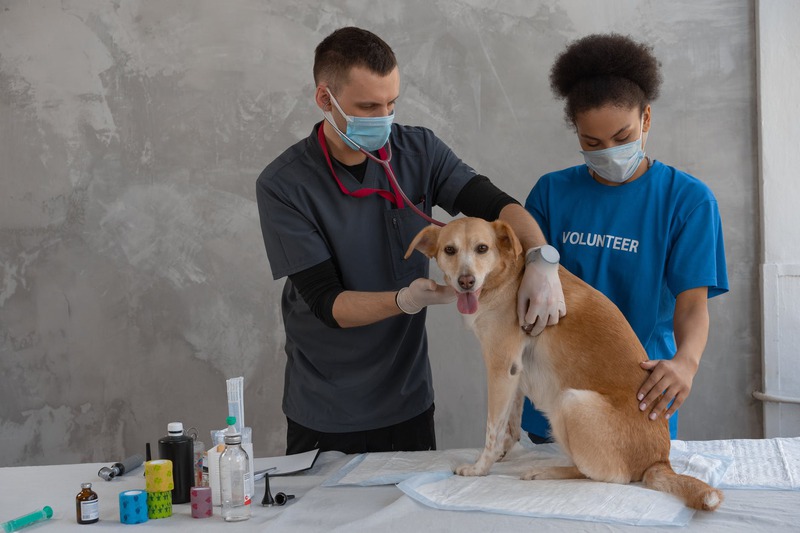If you find yourself wondering this because your beloved pet had suddenly fallen ill or met with an accident, it’s understandable why you’d need the right, prompt answer. The article aims to help answer your questions, ease your worries, and tell you what essential services an emergency vet provides.
The Role of an Emergency Vet
Emergency vets are just like our regular vets but specialize in handling sudden, often life-threatening situations in animals. The unpredictability of health emergencies with pets makes this service a caring owner’s priority, as the rapid response can significantly affect the pet’s recovery rate. They perform multiple functions to ensure optimal health for our furry friends. Check this page to learn more about emergency veterinarians.
When to Seek Help From an Emergency Vet?
Seek help from an emergency vet in the following situations:
- Traumatic Injuries: For accidents, falls, fractures, or any severe injury, especially if your pet is bleeding heavily or showing signs of shock.
- Severe Illness: If your pet exhibits persistent vomiting, diarrhea, difficulty breathing, or sudden lethargy.
- Toxic Ingestion: If you suspect your pet has ingested a toxic substance, such as human medications, household chemicals, or poisonous plants.
- Difficulty Urinating: It could signify a life-threatening urinary blockage for male cats or dogs struggling to urinate.
- Uncontrolled Bleeding: If your pet experiences uncontrolled bleeding from any wound or body orifice.
- Unconsciousness or Collapse: If your pet collapses, loses consciousness, or shows signs of neurological issues.
- Seizures: If your pet experiences a seizure that lasts longer than a few minutes or has multiple seizures in a short period.
- Eye Injuries: For any injury to the eye, such as a puncture or a chemical exposure.
- Ingestion of Foreign Objects: If your pet swallows something that could cause an obstruction, such as small toys or bones.
- Difficulty Giving Birth: If your pregnant pet experiences prolonged labor without delivering a puppy or kitten.
Remember, when in doubt about your pet’s health, it’s better to err on the side of caution and seek immediate veterinary care from an emergency vet. Timely intervention can significantly affect your pet’s outcome during critical situations.
Services Provided by an Emergency Vet
1. 24/7 Availability
- Emergency veterinarians are available around the clock, providing immediate care when regular veterinary clinics are closed and ensuring pets receive timely attention during emergencies.
2. Trauma Care
- They are equipped to handle pets involved in accidents or traumatic incidents, such as car collisions, falls, or animal attacks.
- Immediate evaluation and treatment help stabilize pets with severe injuries and prevent further complications.
3. Critical Care
- Emergency vets provide intensive care for pets with life-threatening conditions, such as severe injuries, respiratory distress, or cardiac emergencies.
- They monitor vital signs and administer necessary treatments to stabilize pets in critical conditions.
- They also offer their pet surgical services if they assess your pet warrants one.
4. Toxicity and Poisoning
- Emergency veterinarians promptly diagnose and treat pets exposed to toxic substances, including common household items, plants, and chemicals.
- Immediate intervention is crucial to prevent the absorption of toxins into the pet’s system.
5. Cardiac and Respiratory Emergencies
- They can manage pets with difficulty breathing, choking, or other respiratory issues that require urgent attention.
- Oxygen therapy and other respiratory interventions are provided to stabilize the pet’s breathing.
- Emergency vets administer treatments for pets experiencing heart-related issues, such as arrhythmias or congestive heart failure.
- Swift interventions aim to restore normal cardiac function and improve blood circulation.
6. Urinary and Gastrointestinal Issues
- They address acute gastrointestinal problems, including obstructions, bloat, severe vomiting, and diarrhea.
- Immediate care is vital to prevent dehydration and further complications.
- Emergency veterinarians care for pets with urinary obstructions, urinary tract infections, or other urgent urinary issues.
- Prompt intervention helps relieve blockages and prevent kidney damage.
7. Seizures and Neurological Emergencies
- Emergency vets evaluate and treat pets experiencing seizures, neurological disorders, or other sudden neurological symptoms.
- Rapid assessment aids in determining appropriate treatment and preventing further neurological damage.
8. Wound Care and Bandaging
- They clean and dress wounds, lacerations, and other injuries to prevent infection and promote healing.
- Proper wound management reduces the risk of complications and accelerates recovery.
9. Fracture Management
- Emergency vets stabilize fractures and provide initial treatment for broken bones to alleviate pain and prevent further damage.
10. Emergency Surgery
- They can perform emergency surgical procedures to address internal injuries, remove foreign objects, or manage certain conditions.
- Swift surgical intervention is critical in many life-threatening situations.
- Emergencies can extend beyond physical injuries or sudden diseases. A pet’s eye health is often overlooked until it becomes critical and needs eye surgery. Hence, treating symptoms of eye conditions earlier through prompt vet consult is necessary.
11. Blood Transfusions
- Emergency vets administer blood transfusions to pets in critical conditions, such as those with severe anemia or bleeding disorders.
- Transfusions help restore blood volume and improve oxygen delivery to vital organs.
12. Pain Management
- They relieve pain and manage discomfort in pets suffering from acute injuries or conditions, ensuring their comfort during recovery.
13. Diagnostic Imaging
- An emergency vet can access diagnostic tools like X-rays and ultrasounds for rapid and accurate injuries or internal problems diagnosis.
14. Laboratory Services
- They perform on-site laboratory tests, such as bloodwork and urinalysis, to immediately assess a pet’s health status.
- Quick diagnostic results aid in timely treatment decisions.
15. Intravenous Fluid Therapy
- Emergency vets administer fluids intravenously to stabilize dehydrated or critically ill pets, maintaining fluid balance and blood pressure.
16. CPR and Life Support
- They are trained to perform cardiopulmonary resuscitation (CPR) and provide life support measures for pets in cardiac arrest or respiratory failure.
- Immediate action can be life-saving in emergencies.
Emergency veterinarians ensure that pets receive immediate and appropriate care during emergencies.
Conclusion
Emergency vets play a critical role in animal health care. Regardless of when a health issue might arise, these dedicated professionals are always on standby, ready to provide the vital care our pets need. Knowing what an emergency vet does is beneficial and mandatory for every pet owner. It empowers us with the right information during crises, helping safeguard our pets’ lives when every minute can make a difference.





